Aston Martin Unveils The 2021 F1 Safety And Medical Car
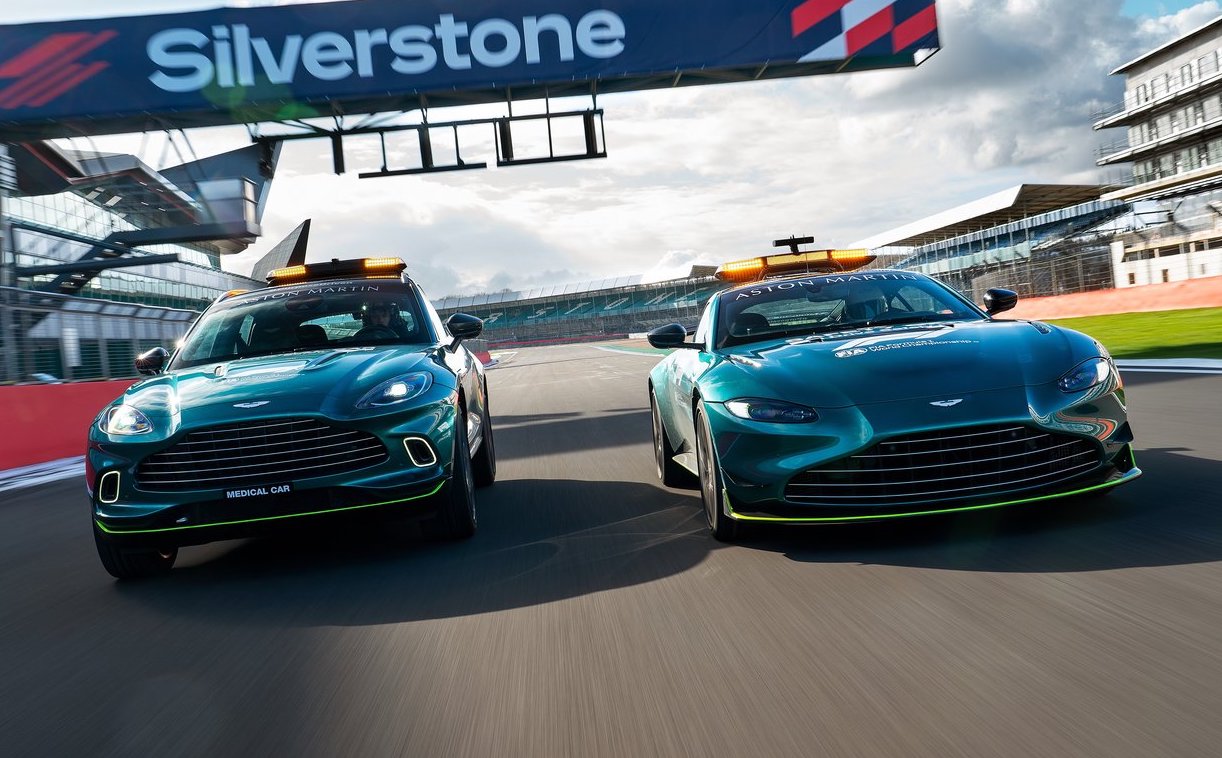
Meet the new Aston Martin Vantage safety car and the DBX medical car for the 2021 F1 season.
There might be more than 2 dark green Aston Martins on the track during this coming 2021 Formula 1 season. That is because not only has the British supercar manufacturer rejoined the motorsport as a factory team after in over 60 years, but the automaker will also be supplying its Vantage and DBX models to act as F1’s official safety and medical cars.
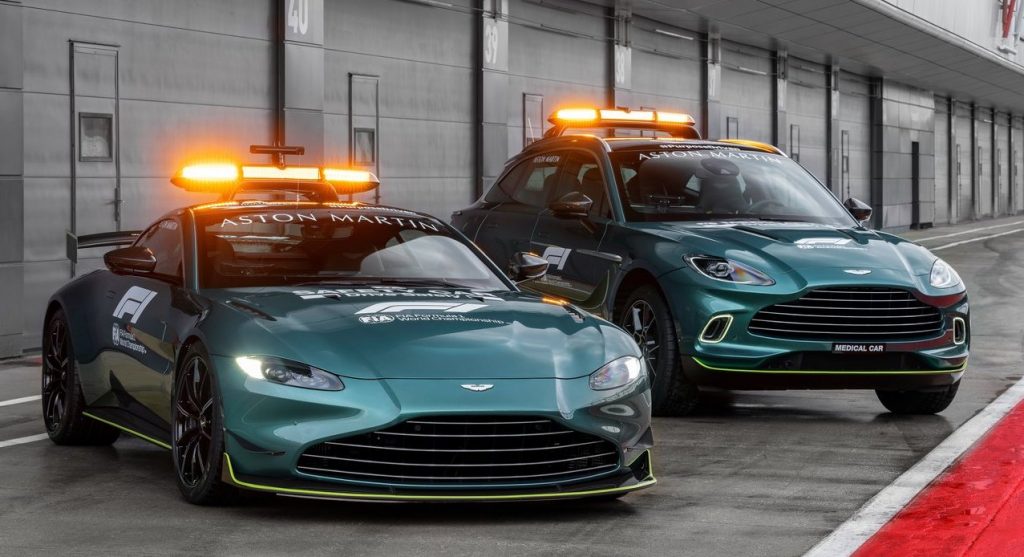
The first time for an Aston Martin to be granted this role in Formula 1, both the dark green Vantage and DBX will be sharing its safety and medical car duties with the existing Mercedes duo that comprises the AMG GT-R and the C 63S estate. Both of which have incidentally ditched its iconic silver paint job and have transitioned to sporting a striking red colour, which is supposedly as an homage to the German marque’s iconic 300 SEL 6.3 rote sau touring car.

Speaking more of the Vantage safety car, as it is being used primarily on track at high speeds, Aston Martin has therefore fettled around with the car to ensure it is up to the task. To that end therefore, the power output 4.0 litre twin-turbocharged V8 has been bumped up by 25 PS to 535 PS. Thereby equating a 0-96 km/h time of just 3.5 seconds, as opposed to 3.6 for the standard production model.
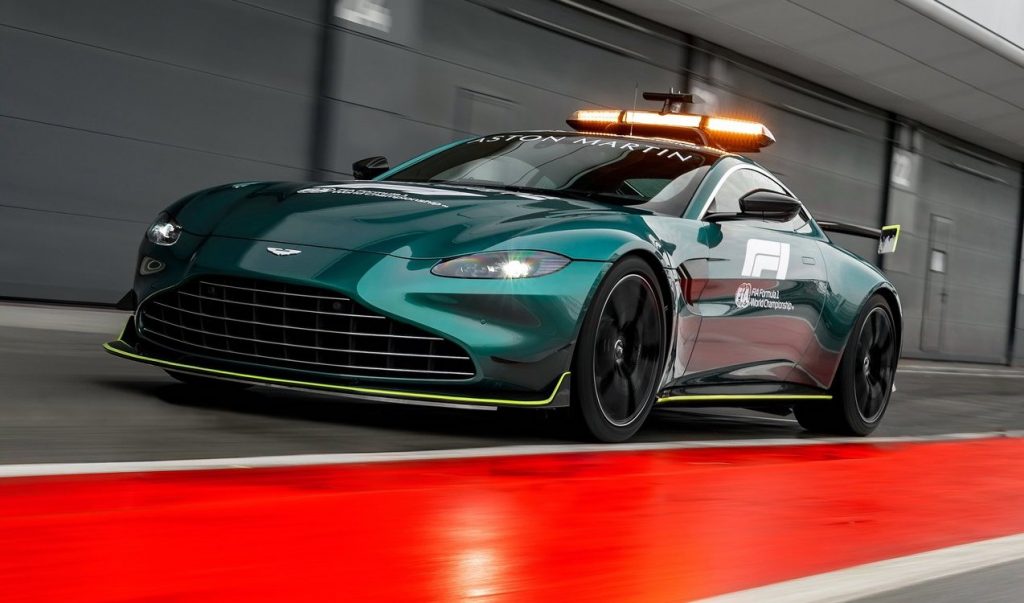
Additionally, the 8-speed automatic transmission has been significantly uprated for this purpose, as are the suspension, steering and dampers too. Other performance related modifications made to the Vantage safety car includes comprehensive aero package consisting of a new front splitter and a fixed rear spoiler, lower profile tyres, not to mention a GT4-spec cooling system and carbon-ceramic brakes.
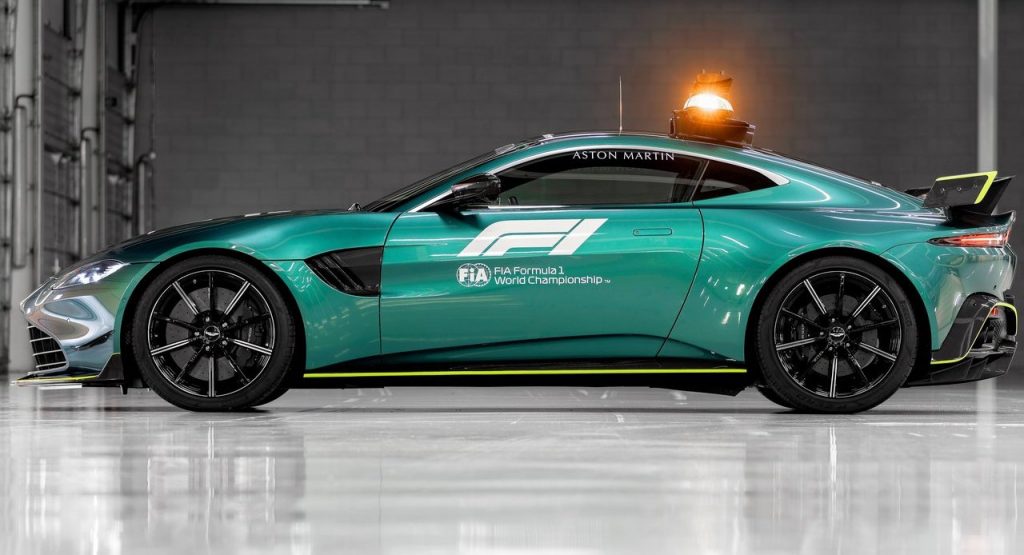
Now aside from all its performance modifications, this dark green Vantage also features much of the kit for it to perform its marshalling purpose while leading the pack of Formula 1 cars. On the outside, this extra kit consists of the roof-mounted light bar with an integrated rear facing camera, a LED number plate, the signature FIA safety car livery and bodyside mounted radio antennas.
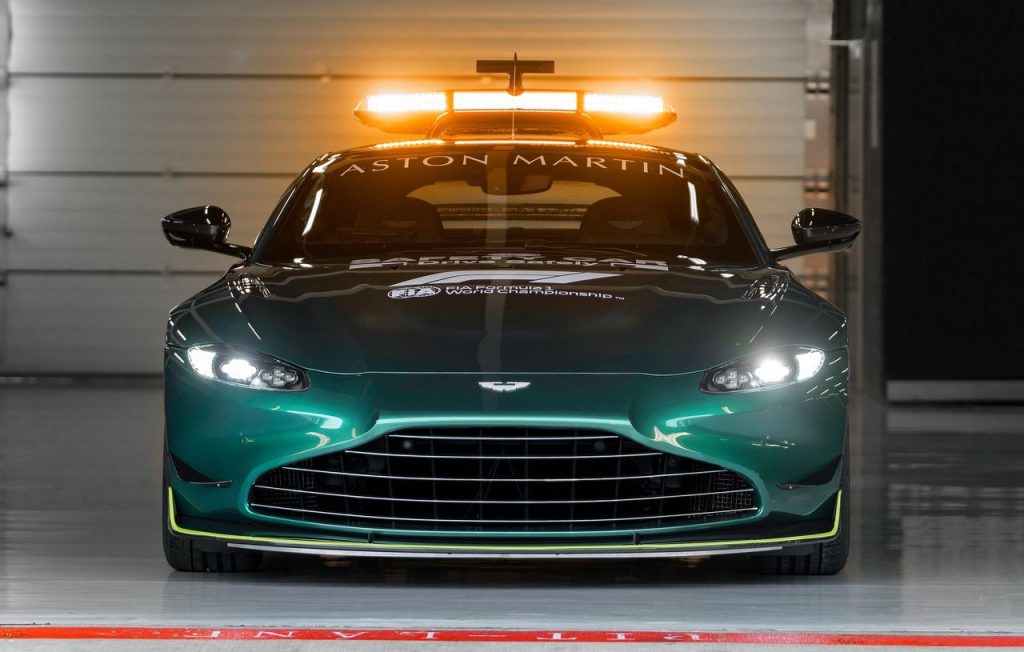
Moving inside meanwhile, FIA-approved racing seats equipped with a 6-point safety harness replace the standard production seats. Furthermore, an array of screens, buttons, dials and knobs are to be found within the heavily modified dashboard and centre console as part of the ‘Marshalling System’ of the Vantage safety car.
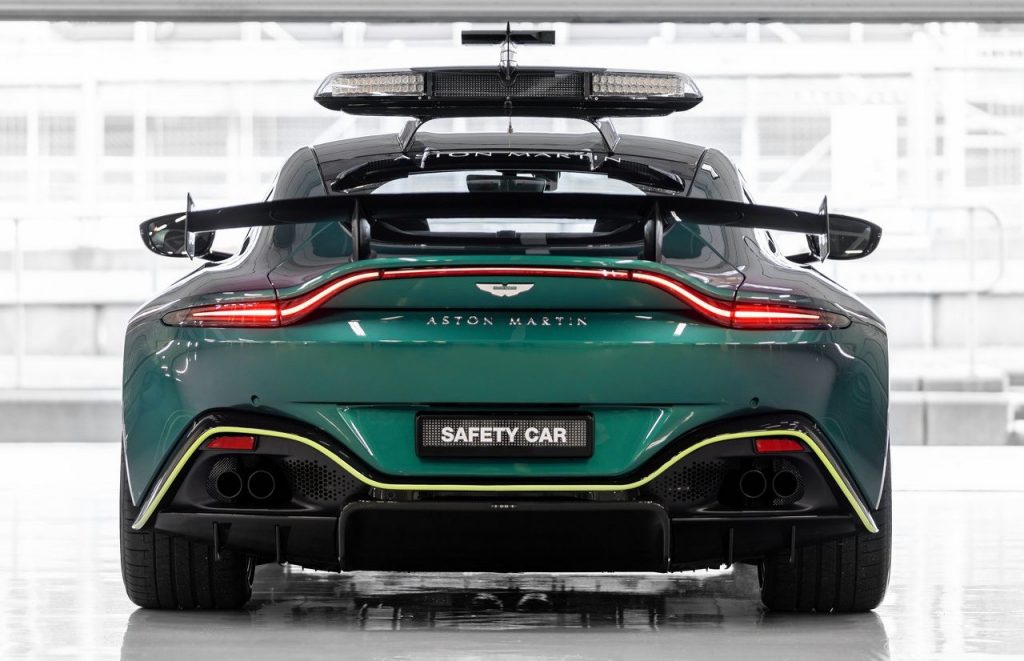
Despite all these enhancements to the car for it to cope with the rigours of the job though, the man behind the wheel however still remain the same as Bernd Maylander, who has been doing this for over 20 years already, will still be piloting the Vantage safety car when it is called for. The same goes to the the driver of the medical car, with Alan van der Merwe retaining his post at the helm of the new DBX.
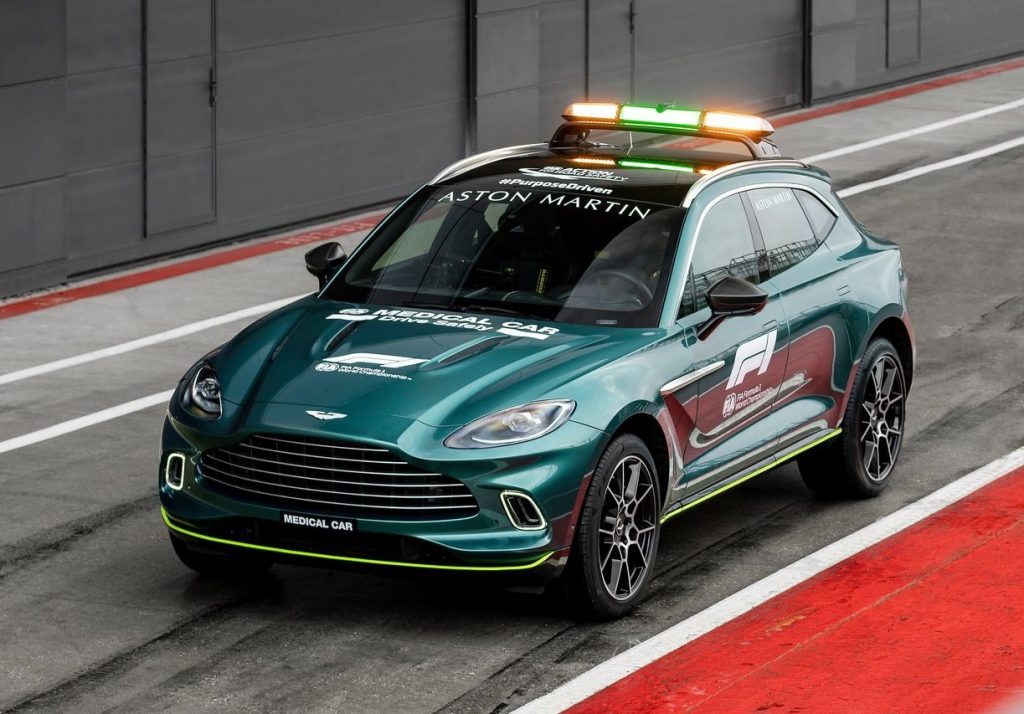
On the topic of the DBX medical car, it features much the same exterior enhancements as the Vantage with its roof-mounted light bar, LED number plates and FIA medical car livery. Having said that, this Aston Martin SUV does not feature any of the performance modifications as to be seen on the safety car.
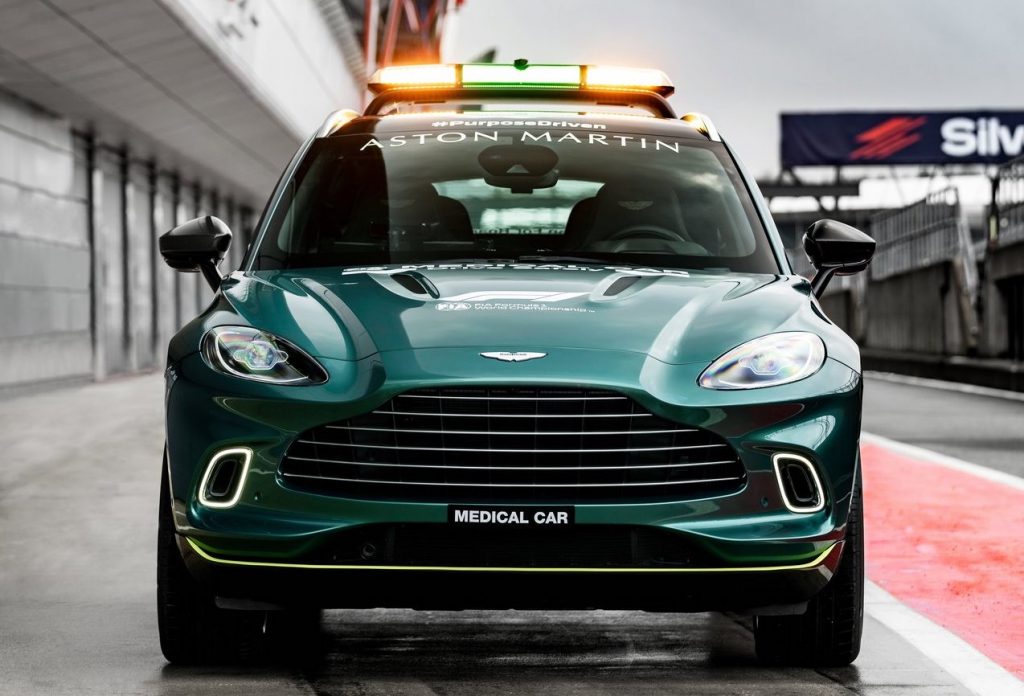
Nevertheless what has been modified extensively would be the cabin of the DBX medical car, which now incidentally features an FIA-spec racing drivers seat and three other sport bucket seats, instead of the five seater layout in a normal production car. Furthermore, in addition to the array of screens and buttons of the ‘Marshalling System’ as per the Vantage safety car, the medical car also gains an extra screen that displays biometric information about the drivers on track that is delivered through technology embedded within their racing gloves.
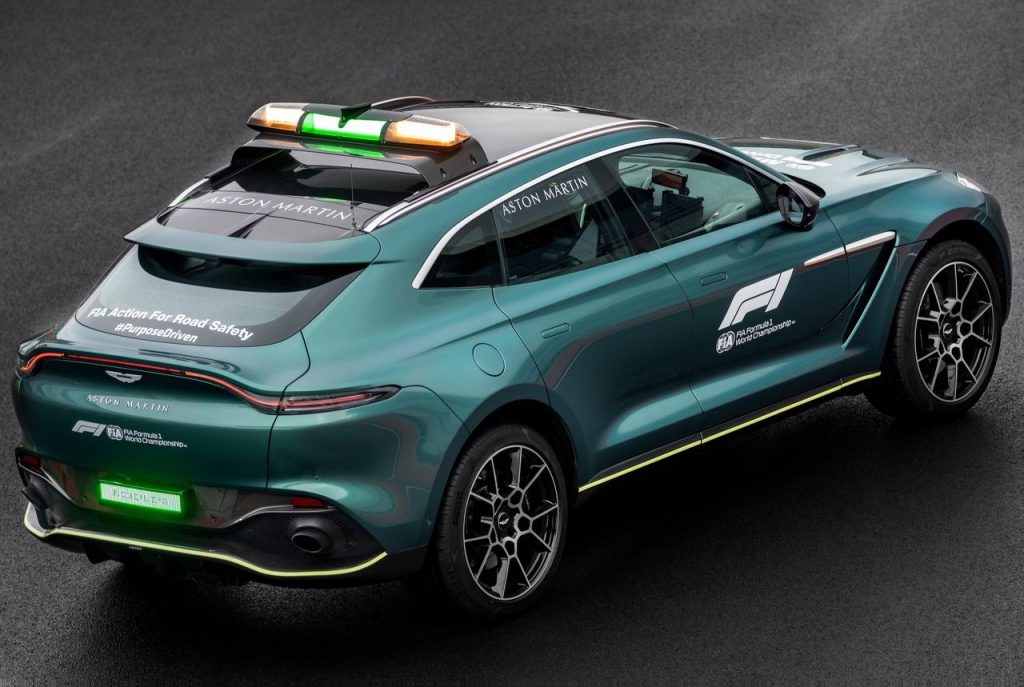
Both cars will make its official debut during the three-day pre-season test at Bahrain on 12-14 March. The first time these Aston Martins will hit the track on a real racing scenario though will be two weeks after that on the 28th of March, when Formula 1 finally returns with Bahrain Grand Prix opening race.
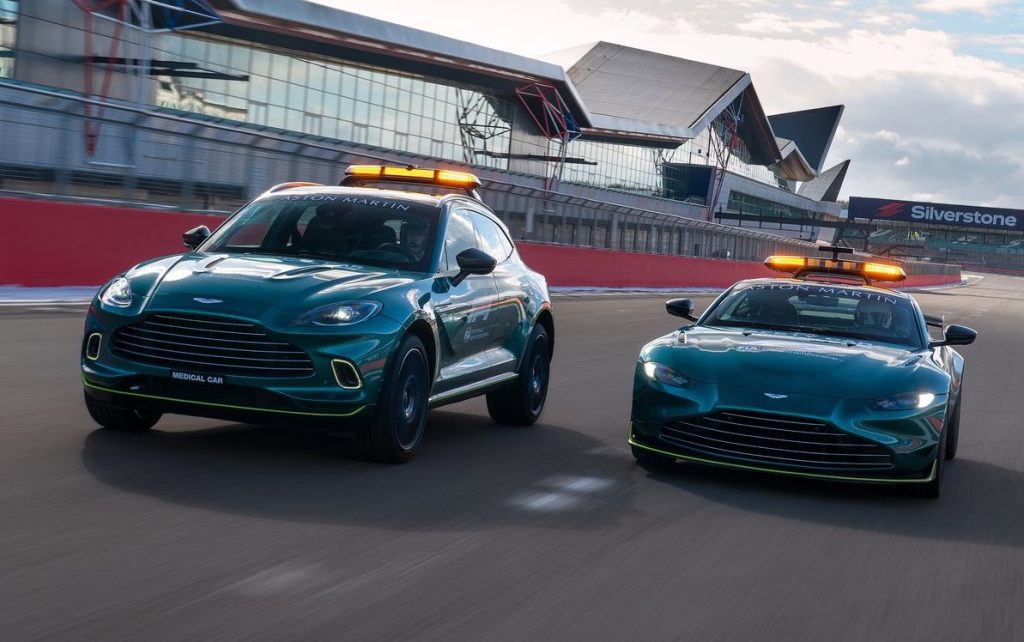
PRESS RELEASE: When Aston Martin makes its return to the FIA Formula One World Championship® at the end of this month, it will be with more than two grand prix contenders on the Formula 1® Gulf Air Bahrain Grand Prix 2021 grid: For the first time in the history of the sport the Official Safety and Medical cars of Formula 1® will also bear the famous wings of the British luxury brand.
A specially equipped version of the Aston Martin Vantage has been developed for the critical role of intervening and controlling the pace of an event involving the fastest racing cars in the world. Engineered by an experienced team at Aston Martin’s Headquarters in Gaydon, the car benefits from significant chassis and aerodynamic improvements. With only a few additional modifications to make it FIA compliant, the new safety car is the pinnacle of Vantage performance.
Aston Martin DBX, the brand’s critically acclaimed first SUV, will also take on the role of an Official Medical Car of Formula 1®, showcasing its own power and handling prowess as it launches into action to support in the event of an emergency.
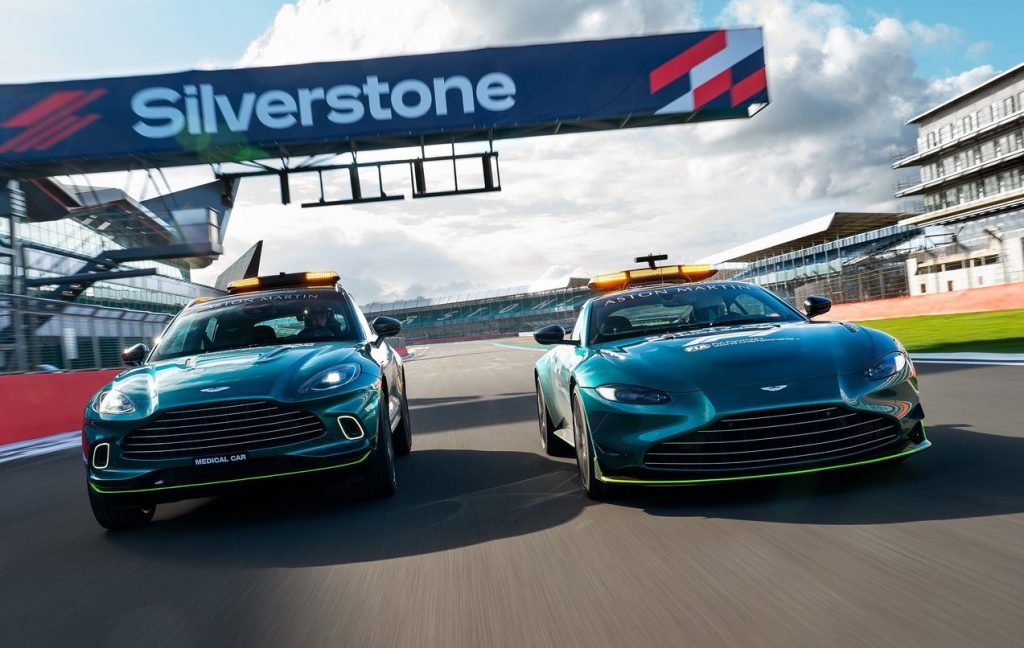
Aston Martin Vantage – An Official Safety Car of Formula 1®
Piloted by FIA’s appointed driver, Bernd Mayländer (DE) who has been at the helm of the F1® safety car for over twenty years, the Aston Martin will remain on standby in the pit lane throughout the race.
When deployed by Race Control in the event of bad weather or an accident, the former race driver and co-driver, Richard Darker (UK) will take to the track at the head of the field to safely control the pace of the pack, neutralizing the event and allowing any incident to be managed safely by the circuit’s officials.
F1® tyre temperatures can drop when the cars are running at sub-optimal speeds, therefore fast lap times are essential for the Official Safety Car of Formula 1®. This responsibility led the Aston Martin Lagonda CEO, Tobias Moers to task the engineering team with enhancing the already sporting Vantage, focusing on improved track performance and lap times.
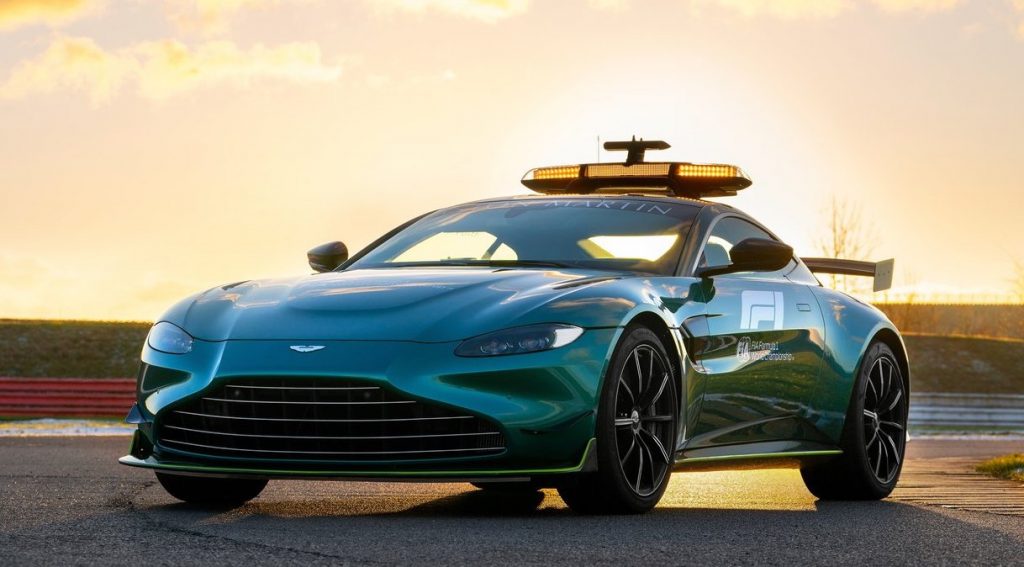
The results? Power has increased by 25PS to 535PS, delivered by a 4.0-litre twin-turbo V8 delivering significant performance capability going from 0-60mph in just 3.5 seconds. 685Nm of peak torque remains the same but is now sustained for longer, and with additional work on the transmission means the driver has a better sense of directness, precision, and control through upshifts and downshifts. The Vaned grille coupled with a new front splitter creates 155.6kg of downforce at 200km/h; more than 60kg than the production Vantage produces at the same speed. Modifications to the suspension, steering and dampers have also been undertaken, with further detailed underbody bracing modifications to increase front structural stiffness. All this, together with a comprehensive aero kit and a switch to lower profile tyres, the Aston Martin Vantage Official F1® Safety Car has all the credentials to handle a Formula 1® circuit.
Aston Martin is known worldwide for its high-profile successes in sports car racing, most recently last year’s multi-class victory at the 24 Hours of Le Mans that contributed to becoming FIA GT World Endurance Manufacturers’ Champions. Engineering developments derived from these successes have aided the systems that feature in the F1® safety car. The unique requirements of the safety car mean the vehicle must be capable of going from top speeds, back to idling in the pit lane without so much as a cool-down lap, so a reliable and robust thermal management system is a key element to its performance. Having already developed a cooling system that proved effective in extreme conditions and temperatures on the multiple championship-winning Vantage GT4 race car, Aston Martin transferred this technology into the safety car, along with the addition of extra vents in the bonnet to support further cooling.
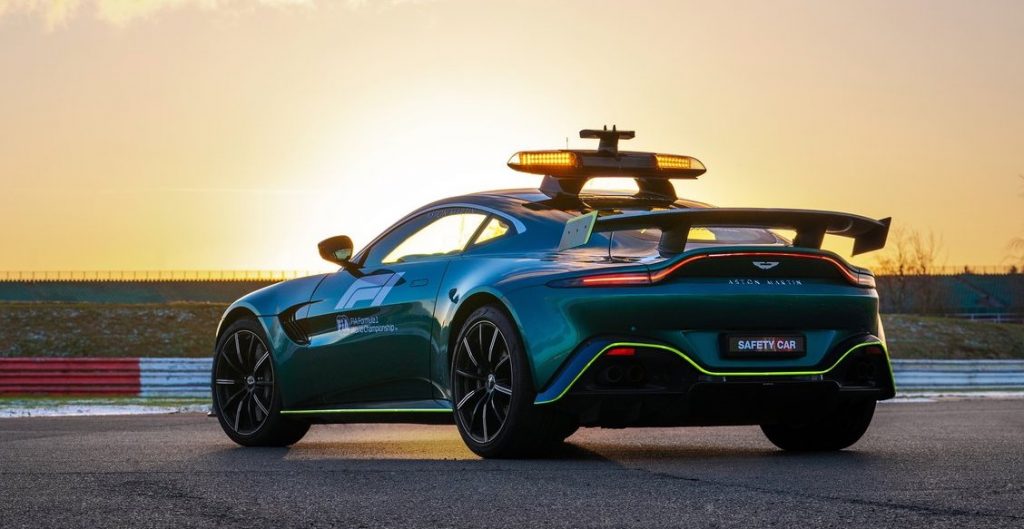
As it performs on standard Pirelli road tyres, the safety car is also equipped with the same carbon-ceramic brakes found on the production Vantage, with additional brake ducts hidden within the front grille to aid cooling.
The safety car mimics the Aston Martin Cognizant Formula One® Team car with an all-new paint colour, 2021 Aston Martin Racing Green, which was developed specifically to celebrate the marques return to Formula 1® racing after more than 60 years. A Lime Essence pinstripe highlights the front splitter; a colour synonymous with Aston Martin’s successful racing pedigree, and most recently used on the ultra-successful Vantage that competed in the FIA World Endurance Championship (WEC). The F1® safety car is otherwise distinguished by its prominent FIA safety car livery, bodyside mounted radio antennas, an LED rear number plate and a bespoke, roof-mounted LED light-bar, developed by Aston Martin.
The light-bar sits on a carbon fibre plinth, raised above the roof line. The aerodynamic profile is designed to offer the least possible resistance while providing an optimised flow of air towards the exaggerated rear wing. Bright orange lights on the outer edges of the light-bar illuminate when the Official Safety Car of Formula 1® joins the track. A centrally positioned amber flashing light then illuminates once the safety car is in position ahead of the race leader – indicating that no one should overtake; two centrally positioned green lights are illuminated once it is safe for the F1® cars to pass. The headlamps and taillamps also flash to aid the safe deployment of the car. The rear number plate displays ‘Safety Car’ illuminated by LED’s, making it clear to see from vehicles behind in all weather conditions. A rear facing camera is also fixed to the light-bar that feeds a live image into a second rear-view mirror located inside the cabin, allowing the co-driver to monitor any activity at the rear.
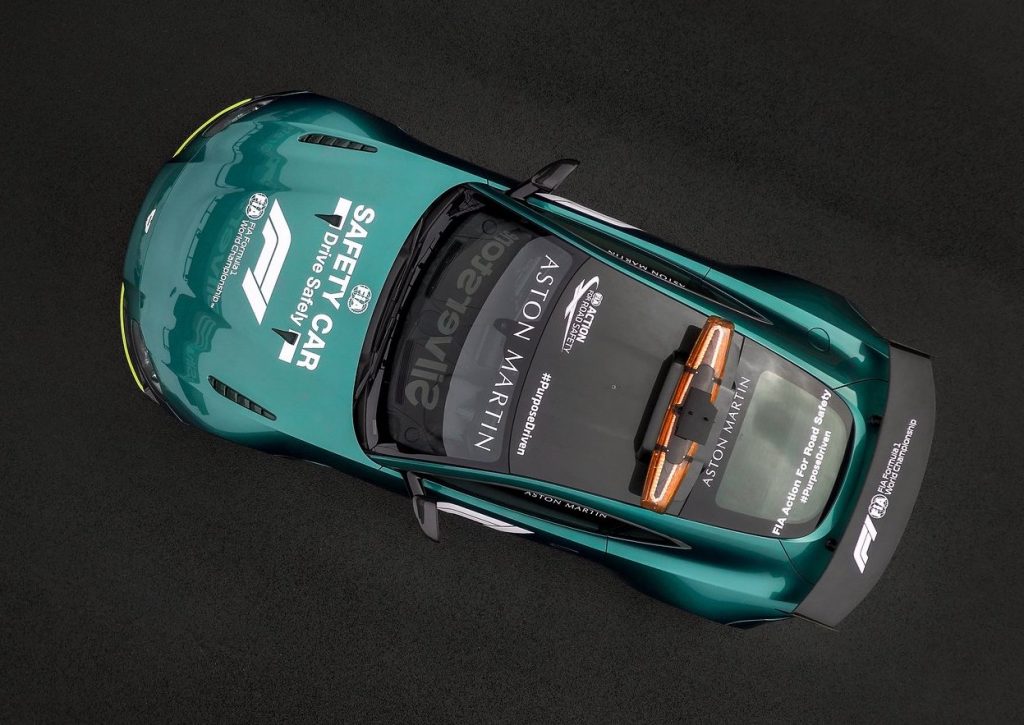
Further, inside the cabin the production seats have been replaced by FIA-approved racing seats equipped with a 6-point safety harness, the same as those found in the F1® team cars. Two screens are mounted on the dashboard, providing the driver and co-driver with a live television feed and a variety of customizable information displays, including live lap timing and the track positioning of all active race cars. The centre console has been modified significantly. The rotary dial has been moved back to where the cup holder was positioned, and in its place sits a switch control system used to execute a number of actions, including activating the siren, radio communications and controlling the light-bar LED’s. The ‘Marshalling System’ is integrated into the instrument cluster and the dashboard, allowing both the driver and co-driver to see which colour flag is being shown on the track, by the illumination of the same coloured LED light; mirroring the system that also features by regulation in all F1® team cars. TV cameras are also mounted on top of and inside the car, to provide live TV footage.
Safety Car driver, Bernd Mayländer said “Formula 1® fans around the world are delighted to see the return of Aston Martin to the track, as am I. The Official Safety Car of F1® is a beautiful, capable car that signifies an exciting new era for Aston Martin.”
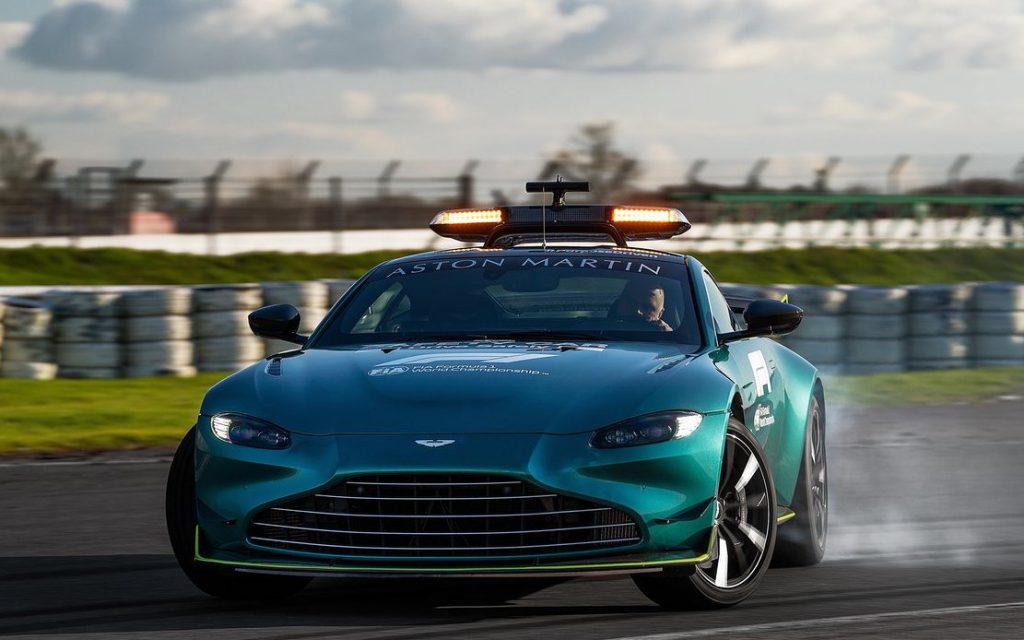
Aston Martin DBX – An Official Medical Car of Formula 1®
Aston Martin DBX will also share the Official Medical Car of Formula 1® responsibilities this season, driven by Alan van der Merwe (41, South Africa). Like the safety car, the medical car is distinguishable by its 2021 Aston Martin Racing Green paint with Lime Green accents – as well as the prominent FIA medical car livery, LED rear number plate and roof-mounted LED light-bar which sits upon the roof rails.
Powered by the 4-litre, twin-turbo V8 engine, also found in DB11 and Vantage, DBX provides an impressive output of 550PS and 700NM of torque which launches DBX from 0 to 62mph in just 4.5 seconds, reaching a top speed of 181mph. All this ensures the FIA medical team can respond effectively to an emergency. With a sound that is unquestionably Aston Martin, the active exhaust system means DBX will not only be seen, but heard, as it does.
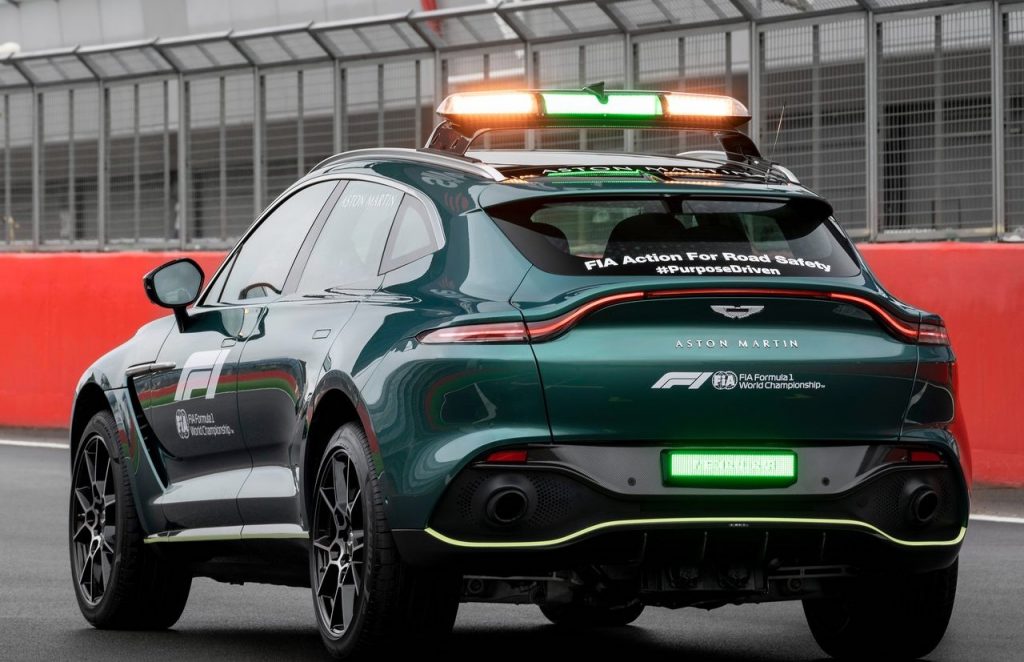
The Official Medical Car of Formula 1® is required to carry a substantial amount of equipment including a large medical bag, a defibrillator, two fire extinguishers and a burn kit – and the DBX is more than equipped with 632 litres of boot space.
Whilst the interior trim is fully representative of a customer vehicle, the central rear seat has been removed, and the remaining four have been replaced with sport bucket seats, each equipped with a 6-point safety harness. These provide seating for the driver, Alan van der Merwe and Dr Ian Roberts – the FIA Formula 1® Medical Response Coordinator, as well as a Local Doctor, leaving one spare, in case an incident requires a racing driver to be driven back to the pit lane. Much like the safety car, two screens have been mounted onto the dashboard to provide live race footage. An additional screen is used to read live biometric data delivered via technology in the drivers’ gloves, which in the event of an accident, provides critical information on their condition. The ‘Marshalling System’ and the rear-view mirror camera display have also been installed into the medical car.
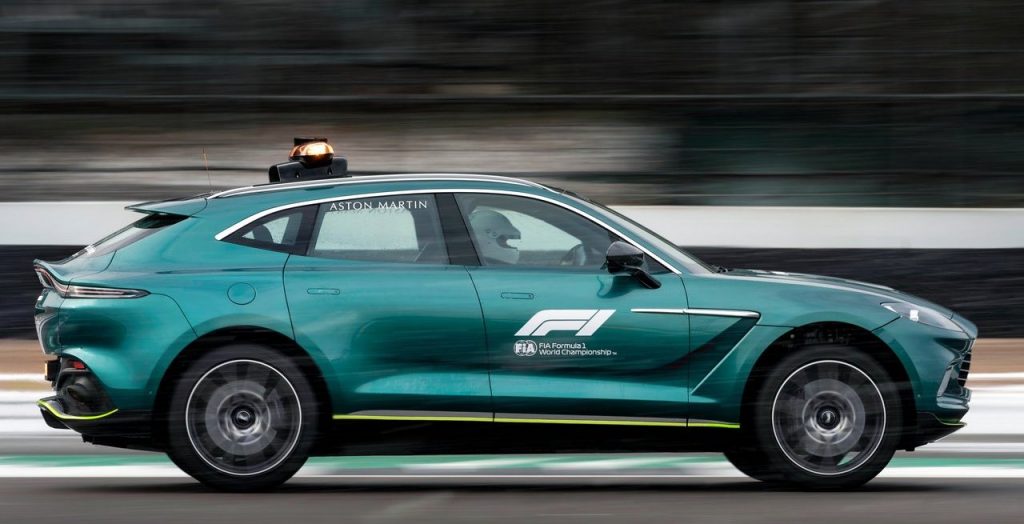
The development of both these Official Safety Car of Formula 1® and Official Medical Car of Formula 1® was carried out by the engineering team at Aston Martin. Both vehicles have endured significant testing, which included high-speed durability assessments and aggressive circuit driving at the Aston Martin facility at Silverstone, totting up almost 15,000km collectively. The vehicles have also been tested in a dyno climate chamber to ensure they will perform in all race conditions.
Tobias Moers, Chief Executive Officer of Aston Martin Lagonda said “Together with the whole company, I am extremely proud of the Aston Martin brands return to Formula 1®, the pinnacle of motorsport for the first time in more than 60 years and represents the start of a significant new era for Aston Martin. To see our acclaimed Vantage, our most dynamic sports car, performing the role of the Official Safety Car of Formula 1 and our first SUV, DBX, operate as the Medical Car on Formula 1® circuits around the world is a proud moment for us all”.
Aston Martin fans will be able to see the Aston Martin Vantage Official Safety Car of Formula 1® in action for the first time during the three-day pre-season test at Bahrain on 12-14 March, and then again during the opening round of the FIA Formula One® World Championship, at the same venue two weeks later.
The Formula 1® Gulf Air Bahrain Grand Prix 2021 will be broadcast live on Sunday 28 March 2021 from 16:00 GMT.





